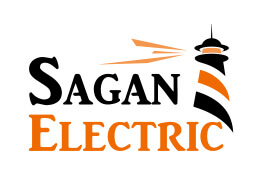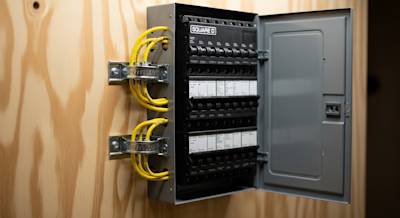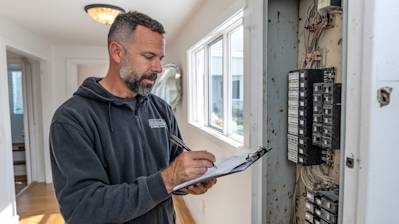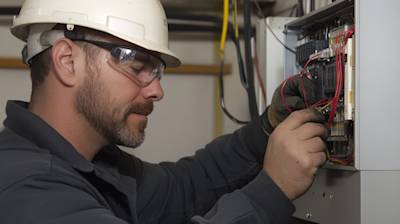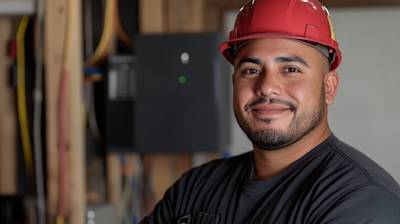When it comes to managing your household or business, many tasks and chores come to mind, from landscaping to software updates. However, one area that should never be neglected in any space is the electrical system. It provides power to nearly every tool, gadget, and appliance that we use on a daily basis and must be maintained properly. Although some tasks, like replacing a light bulb are safe and easy to do on your own, some electrical repairs require a professional touch, for safety and legal reasons. Therefore, certain electrical repairs should not be undertaken as a DIY project.
Understanding the Importance of Electrical Repairs
Electrical systems are a network of wires and circuits designed to distribute electricity from your main electrical panel to various parts of your home or commercial place. When these routes are interrupted through damage, wear and tear, or faulty installations, electrical repairs become mandatory.
However, unlike painting walls or assembling furniture, handling electricity involves a fair degree of peril if not done correctly. Even a simple error can cause serious injury, property damage, or worse. So, it's crucial to know which repairs you can take care of and which you should leave to the experts.
Common DIY Electrical Projects: What You CAN Do
There are several minor electrical works that are generally safe for handy homeowners to manage by themselves, and doing so can help save money on small repair fees. These include:
- Replacing light bulbs
- Changing outlets or light switches
- Installing a new doorbell
Before attempting any DIY electrical task, always turn off the power from the circuit breaker and use the right tools. Without proper precautions, even minor jobs can rapidly escalate into hazardous situations.
Electrical Repairs Not to DIY: What You Should Leave to The Pros
If the work involves wiring, it's almost always safer to hire a licensed electrician. Even a small mistake could result in a dangerous shock or spark a fire, leading to costly collateral damage. Here are some examples of electrical repairs not to DIY, and why you should leave them to professionals:
1. Major Appliance Installation
Major appliances, such as dishwashers, ovens, or central air units require a dedicated electrical circuit with its own breaker on your electrical panel. Professionals are familiar with local building codes and can ensure your installation meets safety requirements.
2. Circuit Upgrades
Your family or business's electrical needs may have changed over time, particularly if you've recently acquired new appliances or advanced technology. Upgrading your home or office circuits should be left to a licensed electrician because it involves working directly with high-capacity wires and your electrical panel.
3. Electrical Panel and Meter Repairs
Your electrical panel and meter are critical parts of your electrical system. Any issues or repairs involving these devices should always be handled by a professional electrician. Incorrect installations or repairs can lead to serious injury or even electrocution.
Finding a Qualified Electrician
When you need to hire a professional, it’s important to choose a good electrician who is both qualified and has a reputation for quality work. Ask for recommendations, check online reviews, and speak directly with potential electricians to assess their experience and expertise.
Be smart and safe when it comes to your electrical repairs. With some minor works, a DIY approach can work well and save money. But there are complicated matters involving your electrical system where you should never attempt DIY repairs. In such cases, hiring a professional is a small cost to pay for peace of mind and the safety of your home, your business, and your loved ones.
Frequently Asked Questions about Electrical Repairs, and When Not to Do-It-Yourself
What are common type of Electrical Repairs?
Common types of electrical repairs usually involve fixing faulty wiring, replacing light fixtures, repairing circuit breakers, troubleshooting outlet problems and installing new switches. Some electrical repairs are fairly simple such as replacing a light bulb, while others can be complex and require expertise, such as panel upgrades or full rewires.
When can I self-perform Electrical Repairs?
There are certain minor electrical repairs you could potentially handle yourself if you are comfortable with basic handyman tasks. These might include changing a light bulb or replacing a fuse. However, it is crucial to always prioritize safety. If you are unsure or untrained, it is best to leave it to professionals.
What Electrical Repairs should I not Do-It-Yourself (DIY)?
Electrical repairs that involve dealing with main power lines or circuits should never be a DIY project. Such tasks include installing a new electrical circuit, replacing a circuit breaker, outdoor wiring, and anything related to the main service panel. These tasks require knowledge and tools that many homeowners do not possess. There could be serious hazards if done incorrectly, including fire or electrocution.
Why should I avoid DIY for certain Electrical Repairs?
Working with electricity can be dangerous if not handled properly. Even with caution, those who are not licensed professionals can make mistakes, which can result in serious injury or even death. In addition, faulty electrical work can pose a long-term danger like electrical fires or constant power interruptions in your home.
How to know if an Electrical Repair requires a professional?
If you lack the necessary skills, or if the task involves main power lines or circuits, it's best to hire an electrical contractor. If the electrical repair involves anything more than replacing a light bulb or a fuse, it's best to call a professional. Always prioritize safety above all else.
What are some signs that I need an Electrical Repair?
Common signs that you need an electrical repair include circuit breakers that constantly trip, a burning smell near your electronics, outlets or switches that are hot to the touch, lights that flicker, or outlets that spark when you plug or unplug a device. If you're noticing any of these signs, it's best to have a licensed professional evaluate the situation.
How to find a reliable professional for Electrical Repairs?
You can usually find reputable electricians through word-of-mouth recommendations, online reviews, or local directories. Make sure to verify their qualifications and credentials. It's important to hire a licensed, bonded, and insured professional to ensure the highest level of professionalism and protection.
What should I expect from a professional Electrical Repair service?
A professional electrical repair service should be able to diagnose and fix your problem efficiently and safely. They should provide a clear estimate of cost and time, perform the work in a timely manner, comply with all safety regulations, and be able to provide you with advice on preventing future issues.
Pros and Cons of DIY Electrical Repairs
Pros of DIY Electrical Repairs
Saving Money
One of the primary benefits of carrying out electrical repairs on your own is the potential for monetary savings. By cutting out the costs associated with hiring a professional electrician, such as labor and service fees, DIY electrical repairs can often be a less expensive alternative.
- No need to pay for professional labor.
- You can shop around for the best prices on materials rather than accepting whatever your electrician provides.
- No additional cost on repeated visits for small repairs.
Convenience
Another advantage of DIY electrical repairs is the convenience that they offer. When you fix electrical issues yourself, you won't have to coordinate schedules with an electrician or wait for them to show up. You can complete the repairs whenever it suits you.
- No need to schedule appointments and wait for professionals.
- You can immediately address any minor electrical issues.
- You can work at your own pace and during your free time.
Learning Experience
Finally, DIY electrical repairs provide a valuable learning experience. You learn about different types of wires, systems, and safety procedures, which can be beneficial in the long term.
- Enhance your knowledge and understand your home’s electrical system.
- Build hands-on skills that can be useful in future repair needs.
- Self-satisfaction of successfully troubleshooting and repairing issues.
Cons of DIY Electrical Repairs
Risk of Injury
The biggest con to DIY electrical repairs is the inherent risk. Handling electricity without the proper training can lead to severe injuries or even life-threatening situations. Even minor mistakes can lead to significant issues like electrical fires or shocks.
- The risk of electrical shock is always present.
- Inadequate repairs can lead to a higher risk of electrical fires.
- Life-threatening accidents can occur if high-voltage systems are mishandled.
Lack of Expertise
Unless you are well-versed in electrical systems, chances are you may not be able to identify or fix the problems effectively. A seemingly simple electrical issue may hide a deeper underlying problem that only a professional can diagnose accurately.
- Misdiagnosis of the problem which leads to unsuccessful repairs.
- Fixes might not be up to code, leading to safety issues and fines.
- Lack of familiarity with different wires and circuits can lead to more damage than good.
Time-Consuming
While DIY electrical repairs provide a sense of convenience, they can also be significantly more time-consuming than hiring a professional. What seems like a quick fix can turn into an all-day affair, particularly if you are not familiar with electrical work.
- Research, troubleshooting, and performing the repair can be time-intensive.
- Repeated trials might be required to rectify the issue.
- Investing time in learning about safety precautions, different wires, and circuits also add to the time.
Long-term Consequences
beyond immediate personal safety, DIY electrical repairs can have grave long term consequences. A poorly done repair could potentially harm the overall electrical system of the house, lead to electrical fires, or reduce the property value.
- Inadequate repairs can cause recurring issues and damage the electrical system of the house.
- Poor electrical work might not meet code requirements, leading to complexities while selling property or insuring your home.
- DIY errors might lead to higher costs in the long run, requiring professional intervention to fix the mess.
Summary
There's no doubt that electrical repairs require a level of expertise and knowledge beyond the regular DIY projects. While it might be tempting to whip out your toolbox and take a stab at it, remember that electrical repairs are not to DIY. The risk involved is not just damage to your house or electrical system, but you might also end up risking your safety.
Electrical repairs are intricate, delicate and can be complicated. It’s crucial to understand that there’s a huge difference between changing a light bulb and fixing a blown fuse or malfunctioning circuit. You could unknowingly create an electrical fault, which could blow your fuse or even start a fire. So, even if you are a seasoned DIY-er, electrical repairs are not to DIY.
All in all, it's crystal clear that DIY isn't always the answer, especially with electrical repairs. Because of the potential for electrocution, fires or other dangerous outcomes, experts always recommend hiring a licensed, trained electrician to handle these issues. Remember to keep safety first, and leave electrical repairs to the pros.
About Sagan Electric
Welcome to Sagan Electric! We are a renowned Sacramento, CA-based company passionate about all things electric. From residential services to large-scale commercial projects, our skilled team is always ready to provide efficient, reliable, and innovative electrical solutions. We have a deep understanding of the unique needs of our community and are committed to ensuring exceptional customer service. At Sagan Electric, we aren't just your local electricians — we're your neighbors who care!
Tags: Electrical Repairs, DIY, Safety Tips,
